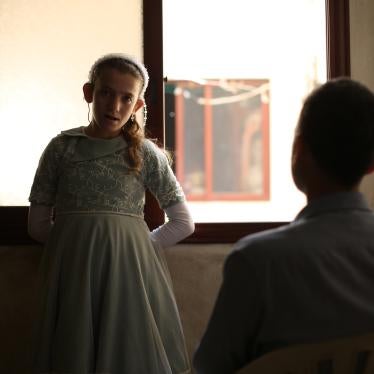Human Rights Watch welcomes the opportunity to discuss the main barriers that persons with disabilities face in the context of situations of risk.
Just as women and children are uniquely affected by conflict and displacement, challenges created by war, natural disasters, and other situations of risk are compounded for persons with disabilities by physical, communication, and other barriers. During the past year, we documented how persons with disabilities are particularly affected by conflict-driven conditions in Yemen, Syria, Gaza, South Sudan, the Central African Republic, and the European refugee crisis.
We found that persons with disabilities face added risks of abandonment, neglect, and lack of equal access to food, healthcare, education, and humanitarian aid during conflict and displacement. When attacks occur, families are faced with a difficult choice: either flee and save themselves, or risk being killed to save a relative with a disability. As a result, people with disabilities are often left behind.
One afternoon, in late 2013 in the outskirts of Bangui, Central African Republic, for example, the sound of gunshots and frantic shouting abruptly woke Ambroise Andet from his midday nap. Startled, the 27-year-old propped himself up where he had been sleeping and looked around for his wheelchair. It wasn’t there. Andet, who has been paralyzed from the waist down since the age of 14, began to panic.
Realizing he had been left behind and without means to flee, Andet screamed for help. His screams went unheeded. With enormous effort, he crawled on the floor, hauled himself to the door of his parents’ house and looked out. The entire neighborhood had fled, and so had his parents.
He ultimately made it to the M’Poko refugee camp near Bangui airport – thanks to the help of a young boy, half his size, who heaved Andet on his back and carried him 2-to-3 kilometers to the camp.
Human Rights Watch documented that between the period of January-April 2015, like Andet, 96 persons with disabilities had been abandoned in their homes, or in deserted villages for days or weeks, with little access to food or water. Eleven persons with disabilities were killed.
Once in the M’Poko camp, life was not easy. For example, several people with physical disabilities told us that they had no choice but to crawl on the ground to enter the latrines, exposing them to potential health risks on a daily basis.
In Yemen, as of November 2015, the UN estimated that 3 million persons with disabilities faced growing challenges in meeting their most basic needs. The closure of nearly 300 organizations that provided specialty services to persons with disabilities in December 2015 further deepened the dearth of support. For example, Hanan, a 4-year-old girl with cerebral palsy and epilepsy in Yemen, needs medications that have become unaffordable as the conflict has continued. Hanan’s father told Human Rights Watch: “Her medication is important for her health because when she takes it regularly, she only experiences an epileptic seizure once every two weeks. But when she does not take the medicine, she experiences a seizure twice a day.”
In our work on the refugee crisis in Europe, Human Rights Watch documented the situation of “Ayman”, a young man with a physical disability from an injury incurred when a rocket fell on his home in Damascus. He was locked up in an immigration detention center in Hungary for crossing the border from Serbia. When Human Rights Watch interviewed him in October, he had been locked up for more than 40 days. He told us that his wheelchair had broken at the border, and he spent 23 days lying on a bed until his lawyer was able to get a donated wheelchair for him. “Every two or three days all the others are taken out to the courtyard to get some fresh air, for 15 or 20 minutes,” he said. “I haven’t been out for 42 days because of the stairs. Even animals are treated better.”
During emergencies, governments, donors, and aid agencies should ensure that persons with disabilities have equal access to basic services and that their needs are addressed in humanitarian efforts. Those providing aid should consult with and engage people with disabilities and organizations representing them to develop a more effective and inclusive response.
Finally, the Human Rights Council should also call for the development and adoption of a charter on the inclusion of persons with disabilities in humanitarian action and an action plan, which should include commitments from governments, UN agencies and humanitarian actors to collect data on persons with disabilities, engage persons with disabilities and their representative organizations in the design, planning, implementation and monitoring of humanitarian programs; and develop and implement globally-endorsed standards and guidelines to support humanitarian action inclusive of persons with disabilities.
People like Andet, Hanan and Ayman who may be confronted with similar challenges in situations of risk are counting on these commitments.







